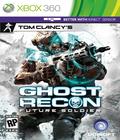The Tom Clancy series has been on a roll. With the sixth Splinter Cell title and a sequel to H.A.W.X. this year, the military fiction-based video game metaseries is finally starting on a much-desired return to its shooter roots. The title is being developed under the watchful gaze of Ubisoft Paris, who brought us Advanced Warfighter but has been largely occupied with Rayman: Raving Rabbids for the last few years. With headphones over my ears to isolate the game's sound from the noise of E3, I was able to check out Ghost Recon: Future Soldier, which is poised to be one of next year's best shooters.
Future Soldier is based on real military tech that's being researched for a real-world future soldier (15 years from now). The stealth camo suit seems more like something out of Metal Gear Solid than anything real, in spite of frontier research into "invisibility cloak" technology. (No, I'm not joking.) The scenario is a little more down to earth, with civil unrest taking Russia and an unknown force (since it's Clancy, it's probably American) being dispatched to use a combination of their shiny new tech and good old-fashioned skills to save the day. Details weren't provided; we got right into the game, and the rep pointed out item after item and discussed how they affected gameplay.
Right out of the gate, the differences between Future Soldier and other franchises were quite clear. The first of three scenarios was a slow, tense mission of sneaking from a beach all the way to a building, which was located half a mile away. The stealth suit was near-perfect but couldn't handle running, forcing the player to slowly step along the path, occasionally ducking behind something to avoid the imperfections being noticed. We shoot at point-blank range with suppressed weaponry, and at one surprising point, we shot a guard and then held him up so that his buddy wouldn't notice that he was slumped over. After a tense glance, we were on to the target, a dignitary of the enemy force. Voice acting, which is crystal clear and well-acted, immediately kicked in and instructed us to line up a shot and wait for the mark. A half-second after the word "mark!" was announced, the shot was fired, every guard of the dignitary was downed, and the troop had control of the area.
The rep spent a few moments talking about the game's four-player co-op, which I later found out is replacing, not supplementing, the squad command system. It's an exchange that they hope will be worthwhile.
Then the rep loaded up a much shorter second scenario. This time, we had to take out a group of guards. Getting all of them in one marked shot isn't going to happen because after one marked shot, the cover system kicks in. Cover in Future Soldier has two twists: cover can be partially destroyed, and covering puts you into a first-person precision aim mode. In other words, running and gunning is strongly discouraged in the game, as in real life. This scenario finally led into a third, head-on, pitched battle back down on the beach, ending the gameplay on a more traditional note and highlighting the variety of scenarios planned for the title — and that was just in one area.
The demo stage was very polished. With careful planning and opportunities to show off several of the new gadgets, the game clearly set up its technical chops and the array of military technologies that will define the play. Ubisoft Paris is taking this game's style very seriously, and the perspective-switching element should bring the strategy closer to realistic military work.
Fans of the series and cooperative gameplay have to wait a while for Ghost Recon: Future Soldier. Ubisoft has delayed the game until 2011 to give it the time it needs to gestate.
More articles about Tom Clancy's Ghost Recon: Future Soldier













 Tom Clancy's Ghost Recon: Future Soldier features cutting-edge technology, prototype high-tech weaponry, state-of-the-art single-player and multiplayer modes, while going beyond the core Ghost Recon franchise and deliver a fresh gameplay experience, with an unparalleled level of quality that excites long-time fans and newcomers alike.
Tom Clancy's Ghost Recon: Future Soldier features cutting-edge technology, prototype high-tech weaponry, state-of-the-art single-player and multiplayer modes, while going beyond the core Ghost Recon franchise and deliver a fresh gameplay experience, with an unparalleled level of quality that excites long-time fans and newcomers alike.



















